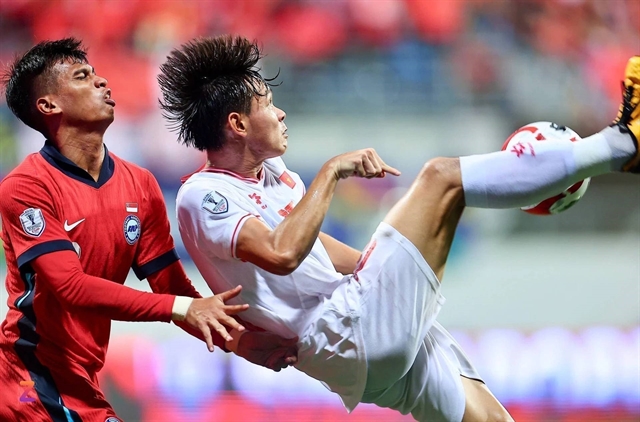 Talk Around Town
Talk Around Town

 |
| Singapore gave Việt Nam a run for their money until they lost their focus in the final minutes. VNA/VNS Photo |
Anh Đức
The 2024 ASEAN Championship is writing a script that no one predicted from the beginning.
With contenders Malaysia and Indonesia knocked out from the group stage, Singapore and Philippines joined top-seeded Việt Nam and Thailand as the region's best four teams, and the results in the first leg showed that they were no pushover.
Let's go over Singapore first, who held Việt Nam to a standstill until the final minutes of added time.
Their coach, Tsutomu Ogura, did what he promised before the match: creating difficulties for the on-form rising star Nguyễn Xuân Son, who was menacing against Myanmar.
Stats-wise, Singapore held on to 67 per cent of possession in the first leg match at Jalan Besar, and had double the amount of passes made, with a whopping 80 per cent pass completion rate.
Việt Nam had most of their passes against Myanmar at home and also in Singapore launched towards Xuân Son, whose athletic ability made him suited to catch onto those passes where defenders could not reach.
Singapore's plan was then simple: keep the ball on the ground, keep possession, and stop long balls from reaching the tall striker. The plan was executed well, with Singapore even having dangerous chances in the latter part of the second half.
Mentality and focus were what hindered the Lions from securing a draw at home, a problem that has surfaced since the 2-4 loss against Thailand in the group stage, a match where they led 2-0 against the giant and could have gotten away with a victory.
A clumsy last-minute penalty and an ignorant defensive mistake made the task for Singapore in the second leg way more difficult, a task that The Straits Times' Deepanraj Ganesan compared to "climbing the mountain ranges of Xuân Sơn National Park in Phú Thọ".
Thailand's match against Singapore is perhaps this tournament's best match and also a principal talking point in this article. The Thais almost lost control of the game and the entire match after going down 0-2 in the opening minutes.
The flaws of Thailand's defence are not difficult to see, and it is clearer if you pull up the stats. After the explosive 10-0 win against Timor Leste, Thailand has conceded five goals in the remaining four matches of the group stage—a stat that made Thai fans worry more, considering that in the past three editions of the ASEAN Championship, no championship-winning team has conceded more than four goals throughout the tournament.
One can argue that Thailand did not send their best players to this edition; however, the quality of attacking players still outmatched almost all of their regional opponents. The War Elephants had more dangerous chances against the Philippines, but mostly due to the stellar efforts of Supachok Sarachart and Suphanat Muenta. In midfield and defence, the Filipinos played as well as, and sometimes better than the Thais. The late goal that sealed The Azkals' victory was deserved, as they were the better team on the day in terms of game control.
Should Việt Nam progress into the final, I think that Thailand's weaknesses in midfield and defence could be capitalised well, whereas the Philippines could create difficulties for Việt Nam as they have in the group stage game.
This version of the Philippines, with athletic naturalised and expat players, along with a modern possession-minded coach in Albert Capellas Herms, who was the manager of Barcelona B, could prove to be Việt Nam's Kryptonite, should we get a rematch in the final.
And if the Azkals found their success in this tournament, we could be well in for a new rivalry in ASEAN football. VNS




